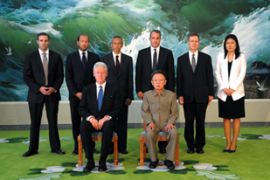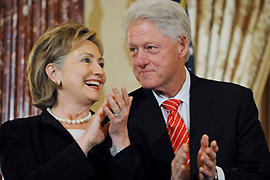Clinton’s high stakes N Korea dash
Former president’s “face-saving” visit may open new chapter in US-N Korea relations.

But aside from the headline-grabbing release of Laura Ling and Euna Lee – who had faced the bleak prospect of 12 years in a North Korean labour camp – the visit also offers what observers say could be the best opportunity yet for a new chapter in US-North Korea relations.
|
“This was a high risk, potentially high reward strategy that could have been embarrassing for all sides and it’s come out really well” Steve Clemens, |
“This was a high-risk, potentially high-reward strategy that could have been embarrassing for all sides and it’s come out really well,” Steve Clemens, a senior fellow and director at the New America Foundation told Al Jazeera.
“Just yesterday things were very bleak and spiralling downward with North Korea, but now a former US president shows up and there’s a whole new set of possibilities.”
With Clinton on his way back to the US, along with the two freed journalists, details have begun to emerge about the delicate diplomatic manoeuvring in recent weeks.
Following the arrest of the two reporters in March there had been much speculation that North Korea would try to use them as a bargaining chip in long-running tensions with the US over its nuclear programme.
But it seems the Obama administration may have taken the case as an opportunity on which to build a new US approach to engage North Korea.
“It was a brilliant, brilliant case of state craft run by Barrack Obama and [Secretary of State] Hillary Clinton”, said Clemens.
“This was a face-saving way, a gesture … This is what former presidents are made for.”
Respect
According to White House staff, North Korea had specifically requested several weeks ago that Bill Clinton visit the country.
 |
| Bill Clinton’s ties to the current adminstration made him an ideal intermediary [EPA] |
Don Kirk, Seoul correspondent for the Christian Science Monitor and a long-time North Korea observer, said that simply by visiting, Clinton had demonstrated a certain US respect for North Korea.
In return, North Korea offered its own gesture by according Clinton a meeting with the North’s reclusive leader, Kim Jong-il.
“It was a tremendous exercise in face-saving,” Kirk told Al Jazeera.
“They wanted Bill Clinton – they got him and that in itself was a triumph.”
Several other candidates had apparently been considered for the visit, including Jimmy Carter, another former US president, and Clinton’s former vice president, Al Gore, the founder of the TV network that employs the two US journalists.
But Clinton, by some “accidents of history”, had a combination of factors that made him the ideal intermediary for both sides, said Richard Weitz, a political and military analyst at the Hudson Institute in Washington.
Clinton, of course, is not only a former US president, but is also the husband of America’s top diplomat, Hillary Clinton, the US secretary of state.
She had recently chastised North Korea, comparing the regime to an unruly schoolchild with its recent spate of nuclear and missile tests.
But at the same time there can be little doubt that she was not closely involved in preparations for her husband to become the highest-profile US figure to travel to North Korea in almost a decade.
That, it would now seem, was all part of the diplomatic game.
Saving face
|
“It seems likely that this event will lead to a two-way dialogue which is something North Korea very much wants” Don Kirk, |
And so from the perspectives of both Pyongyang and Washington, Bill Clinton was the man to send, enabling both sides to maintain face – an important consideration in Asia diplomacy.
“The North Koreans could say they got a former president of the United States who’s very close to the current administration through his wife,” Weitz told Al Jazeera.
“Whereas [the US] could say ‘no, he was just a private person, who was just pursuing this as an individual humanitarian gesture’. So in way he was the ideal person.”
But how much, beyond the release of the two reporters and a photo opportunity with Kim Jong-il, did Clinton’s visit achieve?
Don Kirk of the Christian Science Monitor said one important sign was North Korea’s own reaction to Clinton’s visit.
“In its own statement North Korea said that there had been ‘a consensus of views’ on a lot of issues – what did North Korea mean by ‘consensus’? That’s a question that we’ll have to wait to see answered at a later date.”
Clinton’s visit, he told Al Jazeera, clearly had much more at stake than just the release of the two journalists, and both sides were certainly aware of that.
While officially acting as a private citizen, Clinton was not in a position to make or offer any deals deal himself, Kirk said.
But as a former US president and one closely associated with the current government, he was a in a position to point out the positive effects of co-operation.
‘Positive effect’
 |
| Clinton’s visit may have achieved more than the release of two US reporters [Reuters] |
“Clinton, while seeing Kim Jong-il, spoke of the ‘positive effect’ of the release of the two women,” Kirk said.
“So it seems likely that this event will lead to a two-way dialogue which is something North Korea very much wants.”
Given Washington’s slim intelligence gathering opportunities on the North Korea front, Clinton’s visit would also have offered some opportunity to gain an insight into the current mindset of the country’s leadership, said Richard Weitz of the Hudson Institute.
That would be important for US efforts to rekindle the six-party nuclear disarmament talks which North Korea announced it was abandoning earlier this year.
If Clinton “only went there to recover the two journalists that would be overkill – so one hopes that he used the opportunity to push along the six party talks and understand why things have fallen apart over the past year,” said Weitz.
“We appeared to be making progress and then last year things started to collapse and we still don’t really understand why.”